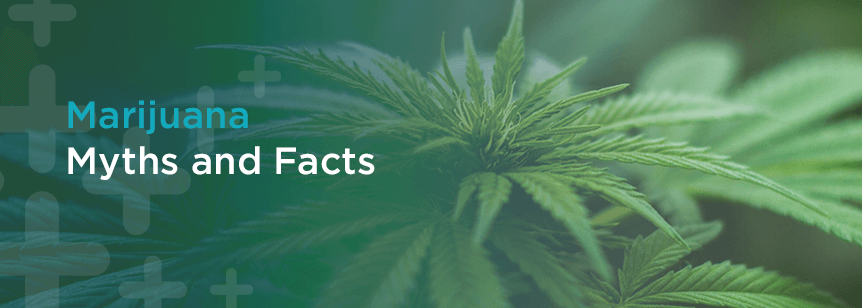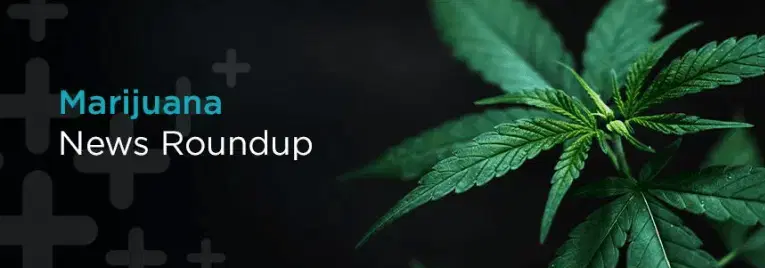Now that 33 states, the District of Columbia, and Puerto Rico have legalized medical marijuana, there’s an increased demand for answers about it: How safe is it? What are the long-term effects? Does it kill brain cells and cause a spike in teen pot smoking?
For years, it was difficult to get the answers to these questions. Reason #1 why: Marijuana is still illegal at the federal level. The Drug Enforcement Administration (DEA) classifies marijuana as a Schedule 1 drug—equivalent to heroin, LSD, and ecstasy, meaning that researchers need a special license to study it.
The drug’s classification hasn’t changed, but in recent years the DEA has agreed to support more research and loosen restrictions on researchers. Here’s what that science is starting to show.
Myth: Medical marijuana is only used for serious illnesses, like cancer
Fact: Cannabis can help treat nausea and vomiting due to chemotherapy in cancer patients. But the most common reason it’s used is to treat chronic pain. Different states allow cannabis prescriptions for different reasons, but some other medical uses include:
- anxiety
- migraines
- multiple sclerosis
- epilepsy
- arthritis
- lupus
- fibromyalgia
- endometriosis
- glaucoma
- post-traumatic stress disorder
- schizophrenia
- irritable bowel syndrome
- Crohn’s disease
- Lou Gehrig’s disease
- Parkinson’s disease
- sickle cell disease
- sexual problems like low desire and premature ejaculation
It’s also been used to stimulate appetite and weight gain in people with eating disorders, cancer, and AIDS.
Myth: Kids don’t qualify for medical marijuana
Fact: Some states have approved cannabis for children with conditions including cerebral palsy, cystic fibrosis, spinal cord injury, epilepsy, intractable seizure disorder, muscular dystrophy, severe autism, and terminal illness requiring end-of-life care. Last year, the Food and Drug Administration (FDA) approved Epidiolex, the first pharmaceutical-grade CBD drug, to treat rare, severe forms of epilepsy in children aged two and older.
Myth: Legalizing medical marijuana leads to an increase in teen pot smoking
Fact: That’s a common concern, but it doesn’t pan out. In an analysis of 11 studies published in the journal Addiction, scientists from Columbia University, Boston School of Public Health, and other institutions found that the passage of medical marijuana laws did not result in increased cannabis use among adolescents. In fact, four of the studies found higher rates of use by adolescents before the laws were passed.
Myth: Legalizing marijuana could help solve the opioid epidemic
Fact: It’s complicated. Experts have suggested that medical marijuana could be an alternative to highly addictive opioid medications like oxycodone and hydrocodone. Since marijuana can be effective in treating chronic pain, the hope has been that legalizing marijuana would cut down on the number of prescriptions for pain meds as well as the number of overdoses and deaths. The problem is acute, now that deaths from drug overdoses have become the leading cause of injury death in the United States.
There is indeed hope: Opioid prescriptions have dropped in states that have legalized medical marijuana. And at least two studies, including one conducted at Johns Hopkins Bloomberg School of Public Health published in JAMA Internal Medicine, found that opioid deaths decreased after a state legalized medical marijuana.
Yet other research, published in the Journal of Addiction Medicine, has shown that medical marijuana users were much more likely than non-users to report taking prescription drugs—in particular, pain relievers, stimulants, and tranquilizers—for medical purposes.
Some experts have also wondered whether marijuana could be effective in treating opioid addiction. Again, the research is mixed. A report by the Maryland Medical Cannabis Commission found that there’s no evidence that marijuana can help, yet also found that marijuana may decrease opioid cravings and ease the physical effects associated with withdrawal, including nausea, insomnia, and anxiety.
Myth: Marijuana is just as harmful as cigarettes
Fact: You’d think that would be true, considering the two contain some of the same ingredients. But it’s not.
The harmful effects of smoking cigarettes—including significant lung damage, chronic pulmonary obstructive pulmonary disease, and lung cancer—are well established. And the more you smoke, the more lung function you lose.
The same doesn’t hold true for marijuana use, though—a fact that surprised researchers from the University of California, San Francisco, who published a study on the topic in the Journal of the American Medical Association. The flow of air into the lungs actually increased rather than decreased with increased exposure to marijuana up to a certain point.
The researchers believe this is due in part to the difference in the amount of each substance that is typically smoked. Nicotine users may smoke 10 to 20 cigarettes a day, or even more, whereas marijuana users smoke two to three times a month on average.
Heavy marijuana use did show a harmful effect on the lungs. But marijuana use for medical reasons typically is not heavy—and there are other ways people can use it rather than smoking, such as by taking capsules, inhaling vapors, and mixing it into food or tea.
Myth: Users of medical marijuana will become addicted to it
Fact: It’s possible to become dependent on marijuana, but this is uncommon. Research shows that about 9% of all marijuana users become addicted—and presumably the percentage is lower among medical cannabis users since they are not typically heavy users.
Certain people are at higher risk for addiction than others—and that’s true across the board for any drug, including alcohol. These risks include a family history of addition, having family and friends who use drugs, and high stress levels.
Myth: Medical marijuana makes you high
Fact: Some does, some doesn’t. Marijuana has more than 100 active components. The two main chemicals are THC (tetrahydrocannabinol) and CBD (cannabidiol). THC produces an elevated state of mind—or “high.” But CBD doesn’t, and patients who use CBD-dominant strains of marijuana tend not to feel a change in their consciousness. Medical marijuana usually contains more CBD than recreational marijuana.
Myth: Medical marijuana kills brain cells
Fact: A 2015 study published in the Journal of Neuroscience indicates otherwise. Researchers at the University of Colorado at Boulder and the University of Louisville looked at four areas of the brain in daily marijuana users and compared them to those areas in nonusers. The result? There were no statistically significant differences in volume or shape between the two groups.
This finding turns previous research on its head. Numerous studies conducted before 2015 showed that marijuana use did harm the brain. A Duke University study found that regular marijuana use decreases IQ, for example, while researchers at Massachusetts General Hospital, Harvard Medical School, and other institutions found that cannabis use causes brain deformities. Those studies, however, didn’t adequately control for alcohol use, gender, age, and socioeconomic status, according to the Colorado and Louisville researchers.
About the Author
Andrea Barbalich, a journalist who has held top editorial positions at Meredith, Scholastic, and Rodale, writes frequently about health for RD, AARP, Health Monitor Network, and other outlets.






